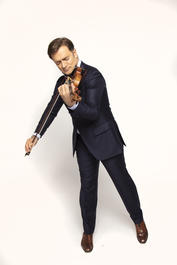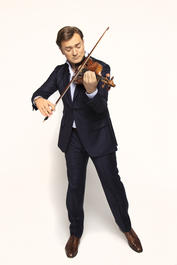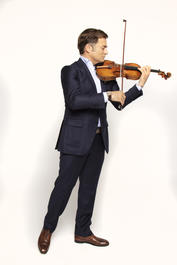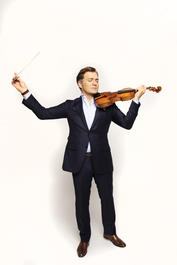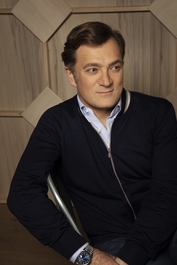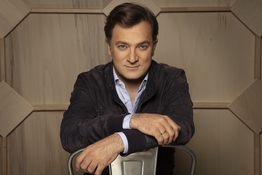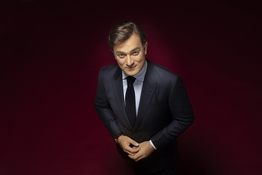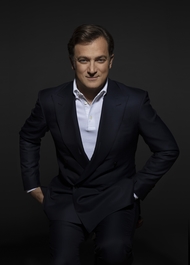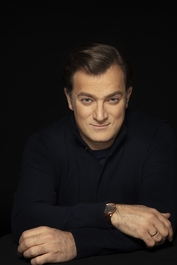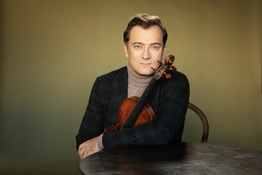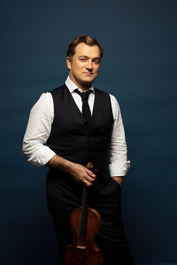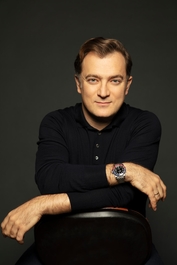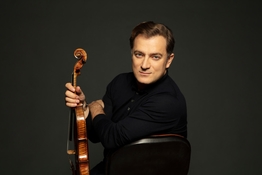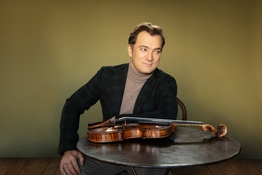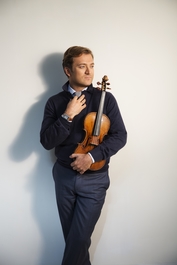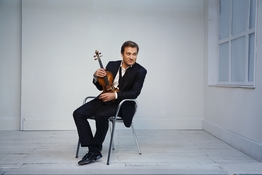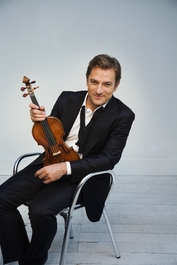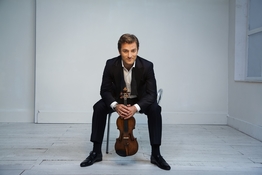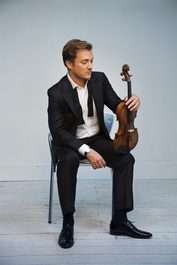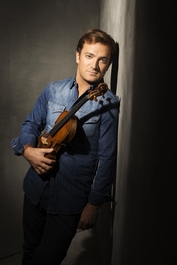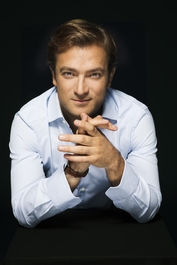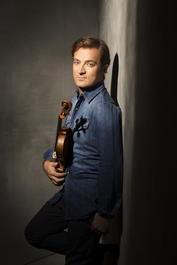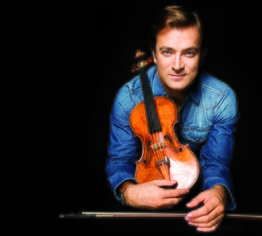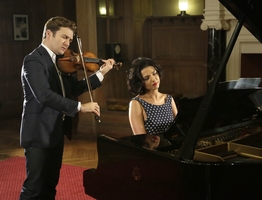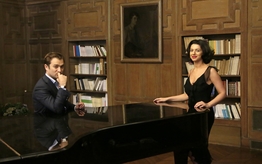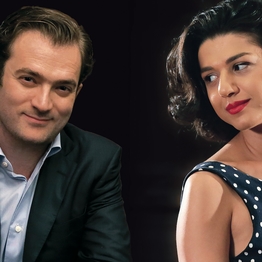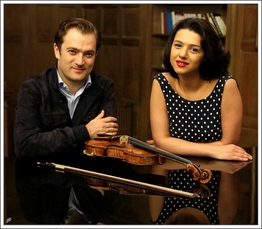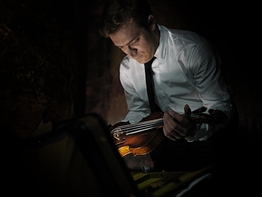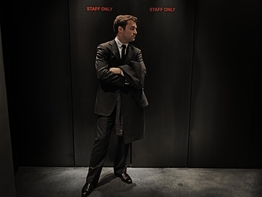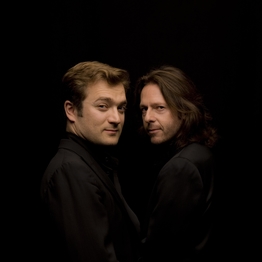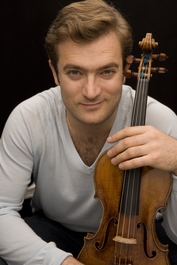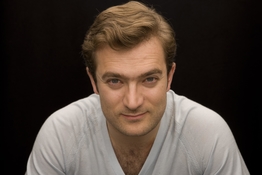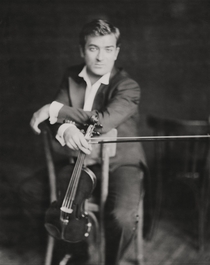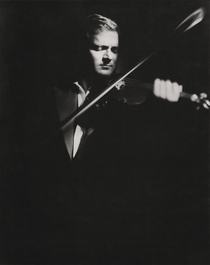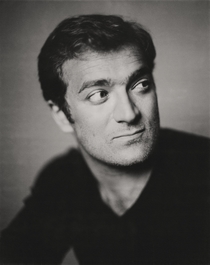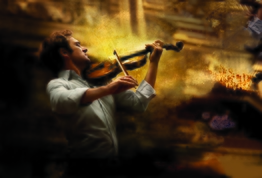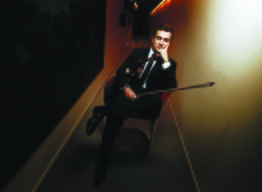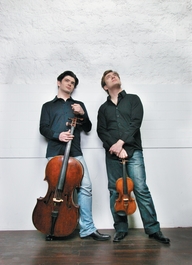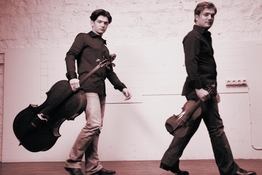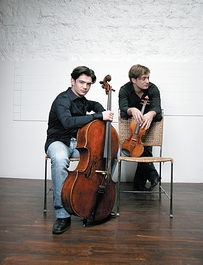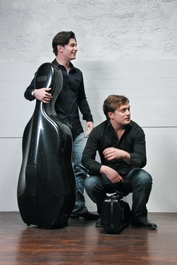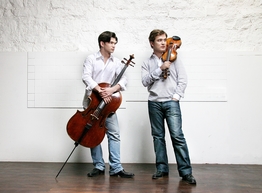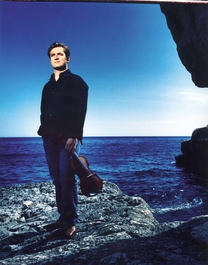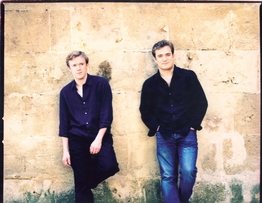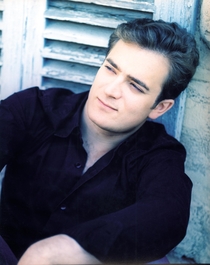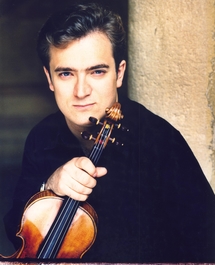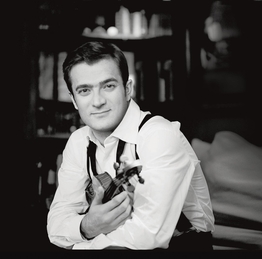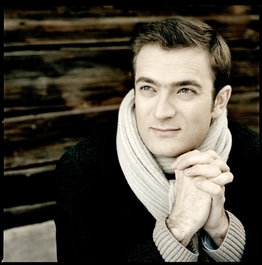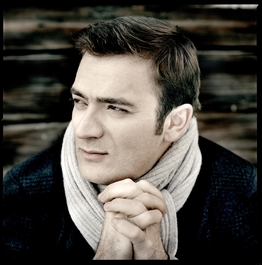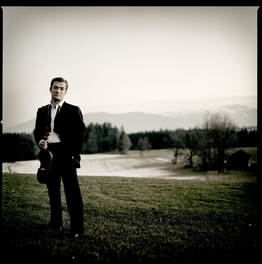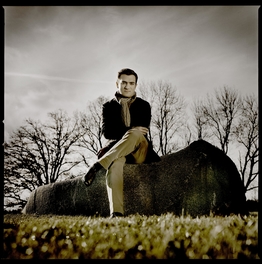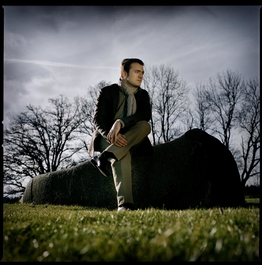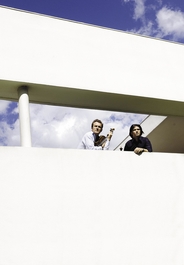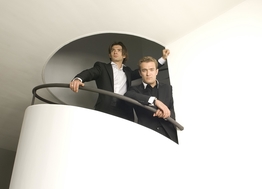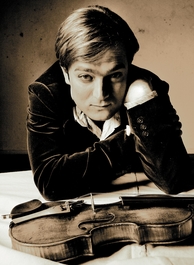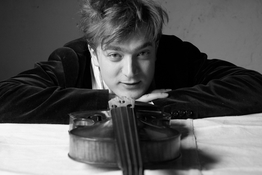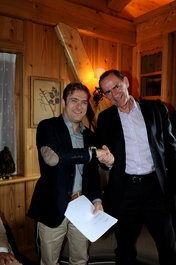Renaud Capuçon
News
The Four Seasons
Renaud Capuçon, firmly established as today’s leading French violinist, describes Vivaldi’s Four Seasons as “a highlight of the violin repertoire”, but it has taken him some time to add the work to his discography. Now he has done so with the Orchestre de Chambre de Lausanne, of which he became Artistic Director in Autumn 2021. To complement Vivaldi’s four concertos he has chosen two concertos composed in Paris in the 1770s – more than 40 years after Vivaldi’s death – and vastly less well known to today’s listeners. They are by the Guadeloupe-born composer known as Chevalier de Saint-George (1745-1799), whose works include a total of 12 violin concertos, 10 symphonies, two sets of string quartets and a number of operas. Writing in the New York Times in 2020, the composer and academic Marcos Balter described Saint-George as a figure who holds a “truly unique place in Western classical music history”. The Handel & Haydn Society in Boston calls him “a notable composer …, and one of the first of African descent in classical music”.
Renaud Capuçon explains that he was in no rush to record The Four Seasons. “For years, I refused to play it. I’d heard it too much in the corridors of the Métro in Paris and as holding music on the phone. But once I’d accepted to play it, I was blown away by the power of the music … I realised that it’s famous because it’s amazing! It’s a masterpiece. I’ve now played it frequently with Orchestre de Chambre de Lausanne and it feels fresh and new every time. It’s amazingly modern – it absolutely works today, even though the seasons might be changing as our climate changes. The music immediately gives us a precise idea whether it's spring, summer, autumn or winter. It also makes us realise how much we need to take care of our earth and its four seasons.”
He first played music by Chevalier de Saint-George – a string quartet – when he was just 12 years old. “Saint-George was a great personality – a violinist, a fencing champion, a soldier … quite an unconventional character. His music is fresh and straightforward.” The two concertos on the album are No 9, op 8 in G major and the concerto in C major, op 5, No 1. “Saint-George’s concertos provided an inspiration for Mozart,” says Capuçon. “The G major concerto is full of energy – and full of notes too, it’s very virtuosic. It’s written for strings only, while the C major concerto adds two horns and two oboes to the scoring.”
In his New York Times article, Marcos Balter, who is the Fritz Reiner Professor of Musical Composition at Columbia University, provides further insight into Chevalier de Saint-George – born Joseph Boulogne – and his music:
“Few musicians have led a life as fascinating and multifaceted … Boulogne, the illegitimate son of a wealthy French plantation owner and an enslaved African-Guadeloupean woman, was born … on the island of Basse-Terre, the western half of the archipelago of Guadeloupe. When he was about 10, he and his mother followed his father and the rest of his legitimate family back to France, where Boulogne was enrolled in elite schools and received private lessons in music and fencing.
“His first claim to fame, in fact, was as a champion fencer … Boulogne’s extraordinary fencing talent led Louis XV to name him Chevalier de Saint-Georges, after his father’s noble title, even though France’s Code Noir prohibited Boulogne from officially inheriting the title because of his African ancestry. He earned a nearly mythical status even across the Atlantic: John Adams [the second President of the USA] described him as ‘the most accomplished man in Europe in riding, shooting, fencing, dancing and music’.
“Very little is known about Boulogne’s musical training. But when François-Joseph Gossec, one of France’s pioneering symphony writers and most prominent conductors, founded the Concert des Amateurs series in 1769, he invited Boulogne to join its orchestra, first as a violinist and later as its concertmaster.
“Boulogne’s first documented compositions are from 1770 and ’71. While these are clearly works by a composer still searching for his voice, they already demonstrate his commitment to the new and unexplored. The six string quartets of his Opus 1 were among the first in that genre to be written in France. His three sonatas for keyboard and violin (Op. 1a) feature those instruments as equals, breaking away from the Baroque tradition of basso continuo, which was still very much in vogue. His harmonies, textures and formal schemes place him within a Classical style that was still in the process of forming.
“His first public and critical success as a composer came with his two violin concertos (Op. 2), which premiered in 1772 at the Concert des Amateurs series, featuring Boulogne himself as soloist. The level of craft and sophistication in these pieces far surpass his efforts of the previous two years. The particularly beautiful Largo movement of the second concerto already features many trademarks of his later style, including a penchant for whimsical colors that run the range of instruments and an understanding of how to balance orchestral forces with clarity.
“When Gossec was invited to direct the Concert Spirituel series in 1773, he named his concertmaster as his successor. Under Boulogne’s direction, the Concert des Amateurs orchestra became widely regarded as the best in France, if not all of Europe …
“In 1778, Mozart traveled to Paris, staying from March to September and briefly under the same roof as Boulogne, hosted by Count Sickingen. It is implausible, to say the least, that Mozart did not hear Boulogne’s music during this period ...
“When lack of funding forced the Concert des Amateurs to end in 1781, Boulogne and his musicians found a home with the newly formed Concert de la Loge Olympique, which quickly gained a reputation as the best orchestra in Europe. It was under this umbrella that Boulogne conducted the premiere of Haydn’s six Paris symphonies, among many other important commissions ... His influence in France and abroad, both as a curator and a creator, was felt long after his death.”
Renaud Capuçon and Simon Rattle record Elgar's Violin Concerto
Elgar’s violin concerto – distinctively passionate and nostalgic – is one of the great late-Romantic concertos, but it is comparatively rarely played. As both Renaud Capuçon and Sir Simon Rattle point out, it is not a piece that has been favoured by French violinists. Perhaps, despite the worldwide currency of the composer’s cello concerto and Enigma Variations, this arises from some lingering perception of the composer’s music as exclusively and mysteriously ‘English’.
At the concerto’s premiere in 1910, the London Symphony Orchestra – which Rattle, as Music Director, conducts for this recording – was joined not by a British soloist, but by Fritz Kreisler, born in Vienna and one of the pre-eminent violinists of his day, indeed of the entire 20th century. He commissioned the work, being of the view that: “If you want to know whom I consider to be the greatest living composer, I say without hesitation Elgar … I place him on an equal footing with my idols, Beethoven and Brahms ... His invention, his orchestration, his harmony, his grandeur, it is wonderful. And it is all pure, unaffected music.”
In 2008, Kreisler was among the great violinists of the past whom Renaud Capuçon honoured with his album Capriccio. “The Elgar concerto is a huge piece,” he says, “both in terms of its length [some 50 minutes] and its romantic and noble nature.” Capuçon has known Sir Simon Rattle for some 20 years, but this is their first recording together. “He is a gentleman in music,” continues Capuçon, “he doesn’t put pressure on the soloist. I had the feeling I could surf on the LSO’s sound. Its players love the music and they are ‘there’ straight away … disciplined, but adapting around you as a soloist.”
Elgar, who was himself a violinist, had a close relationship with the London Symphony Orchestra. In 1905, when the LSO was just a year old, he conducted it on its first provincial tour and it gave the premiere of his Introduction and Allegro. In 1911 he became the orchestra’s Principal Conductor, going on to hold the post for two years. The LSO subsequently premiered his symphonic study Falstaff (1913) and his cello concerto (1919), and in 1932 Elgar conducted the LSO for the legendary Abbey Road recording of the violin concerto with Yehudi Menuhin as soloist.
Sir Simon Rattle chose music by Elgar, the Enigma Variations, for his inaugural concert as Music Director of the LSO in 2017. He describes the violin concerto as “a masterpiece and also a monster piece,” pointing out that it is probably the longest concerto written before the 1960s. “It is conceived on a broad canvas, but it is also very personal and intimate.”
The most celebrated passage of the concerto comes in the final movement with an extended and complex cadenza. Not only is such a cadenza more usually allocated to the first movement of a concerto, Elgar also chose to give it an accompaniment: a shimmering background of what he called ‘thrumming’ on the orchestral strings – a kind of ‘pizzicato tremolo’. Among the material explored in the cadenza is a phrase Elgar called the ‘Windflower’ theme in letters he wrote to a family friend, Alice Stuart-Wortley. Although he was happily married – his wife was also called Alice – he had an intense affection for Mrs Stuart-Wortley, whom he gave the sobriquet ‘Windflower’. It is also highly possible that he had her in mind with the enigmatic Spanish epigraph he placed on the score of the concerto.
Renaud Capuçon senses the idea of a secret love in the slow movement of Elgar’s Violin Sonata, first performed in 1919. Pairing it with the concerto on this album, he is joined by one of the leading British pianists of today, Stephen Hough; the duo first collaborated in early 2020 at London’s Wigmore Hall. “The sonata is a work of nobility and tenderness,” says Capuçon. “The long phrases in the slow movement make me think of someone who is in love, but afraid to say it.” Hough feels that this expressive landscape is “very English in its combination of reserve, frustration and passion. Elgar’s music is not obvious … it can go off in strange directions. Like the violin concerto, the sonata is dangerous music, in that it can get so close to sentimentality, but it never tips over the edge.”
Capuçon, Rattle and the LSO came together for this recording at LSO St Luke’s, a former church, designed in the 18th century by Nicholas Hawksmoor, architect of several famous churches in and around the City of London. St Luke’s, both a concert and recording venue, is near the LSO’s principal home, the Barbican Centre. For their recording of the violin sonata, Capuçon and Hough headed to north-west London and the church of St Jude-on-the-Hill in Hampstead Garden Suburb. Not only was the church designed by Elgar’s great contemporary Sir Edwin Lutyens – in some respects the composer’s architect analogue as a representative of his era – its consecration took place just a year after the premiere of the violin concerto. It also happens that, from 1911-1921, Elgar’s London home was in neighbouring Hampstead.
Beguiling Beethoven recordings to look forward to in February
The chamber-music partnership of Renaud Capuçon, Gautier Capuçon and Frank Braley is well established, and their Erato catalogue already includes piano trios by Schubert and Ravel. The former brought this response from BBC Music Magazine: “The playing is superb from just every angle you consider it: beguiling tone, lovely intelligent phrasing, strong but flexible rhythmic articulation, precise pitch and alert ensemble.”
When the Capuçon brothers and Braley performed Beethoven’s ‘Archduke’ Trio, op 97 at London’s Wigmore Hall in 2011, the Guardian wrote: “Together, all three musicians have the quality that is the most priceless of all in playing chamber music – they listen intently to each other and always take note of what they do. Their account of the Archduke Trio was less imposingly grand than some, almost intimately conversational at times, without any details over-emphasised. It still had a tremendous sense of organic coherence, as if carved from a single creative block, with its heart firmly located in the great set of variations that form the slow movement.”
Beethoven dedicated the ‘Archduke’ – a grandly conceived, but engaging work that was first performed in 1814 –to his patron (and composition student) Archduke Rudolf of Austria. The ’Ghost’ trio, op 70 No 1, takes its nickname from its central slow movement, with its mysterious and uncanny atmosphere. First heard in late 1808, it dates from the same period as the Symphonies Nos 5 and 6.
2018 BBC Proms line-up revealed: Joyce DiDonato, Jean Rondeau and more!
The BBC Proms has revealed its 2018 programme, with several French classical stars making their Proms debut.
On 5 September, Joyce DiDonato reprises the role of Dido in highlights from Berlioz's Les Troyens, this time with John Eliot Gardiner and his Orchestre Révolutionnaire et Romantique. The American mezzo's recent recording with the Orchestre Philharmonique de Strasbourg and maestro John Nelson won the BBC Music Magazine Award for Best Opera Album earlier this month.
French coloratura soprano Sabine Devieilhe will take to the Royal Albert Hall stage for the first time on 26 July in Debussy's sensual cantata La Damoiselle élue, marking the centenary of the French composer's death. She sings Debussy on her latest album of French arias and songs, Mirages.
In another important French debut, Romantic pianist extraordinaire Bertrand Chamayou plays Mendelssohn's First Concerto on 20 July, with the BBC National Orchestra of Wales.
At Cadogan Hall, on 23 July, Jean Rondeau: another Frenchman in another Proms debut, this time an all-French harpsichord recital including music by Royer (from his album Vertigo), François Couperin and a world-premiere by Eve Risser.
Violinist Renaud Capuçon was in London recently for the launch of his Bartók concertos album with the London Symphony Orchestra. He returns 19 August with the Orchestre de la Suisse Romande as soloist in an orchestration of the Ravel Violin Sonata in G Major.
Soprano Diana Damrau sings her heartland repertory, songs by Richard Strauss, with the Royal Liverpool Philharmonic Orchestra and Vasily Petrenko.
A conductor very much familiar to London audiences, Sir Antonio Pappano, brings his Italian Orchestra dell'Accadamia Nazionale di Santa Cecilia to town for Bernstein's Symphony No.1 marking the centenary of the American composer's birth in August. Pappano has recorded the complete Bernstein Symphonies and The Age of Anxiety with the same orchestra and pianist Beatrice Rana for release later this year.
Discover the complete 2018 BBC Proms line-up here.
Vote now and have your say in the BBC Music Magazine Awards!
The shortlists for the 13th annual BBC Music Magazine Awards, the only classical music awards in which the main categories are voted for by the public, have been announced. A jury of expert critics selected this year’s 21 nominees across seven categories from over 200 longlisted recordings reviewed in 2017 by BBC Music Magazine, the world’s best-selling classical music monthly. The public vote is now open at the magazine’s website.
The many distinguished and varied nominees include, in the Opera category, the epic recording of Les Troyens, hailed the new reference recording and topping many Best of 2017 lists including The New York Times, The Guardian and the Chicago Tribune, thanks to its impressive orchestral and choral forces and an all-star cast headed by Joyce DiDonato, Marie-Nicole Lemieux, Michael Spyres and Marianne Crebassa.
'[Conductor John] Nelson drives the drama with unforced tempos but ample theatrical vitality. Spyres...sings with lyrical grace and spirit...Joyce DiDonato sings Dido with characteristic security and expressiveness,' opined BBC Music Magazine in its five-star review.
Flying the French flag in the Chamber category is the sensational team featuring Renaud Capuçon (violin), Edgar Moreau (cello), Emmanuel Pahud (flute) and Bertrand Chamayou (piano) in these mercurial Debussy sonatas - charming one moment, sensual the next. The French critics called the six players a 'supergroup', while BBC Music Magazine noted that 'a sense of joy in collegial music-making pervades these performances. Unlike many, violinist Renaud Capuçon and pianist Bertrand Chamayou and their colleagues do not avoid the vein of sensual passion that glows beneath Debussy's perfectionism...Perhaps the finest all is the beautiful balance of elegiac tone that thins out of the Sonata for Flute Viola and Harp.'
The Concerto category also features French harpsichord firebrand Jean Rondeau on the album Dynastie, with intensely intimate, energised performances of concertos by Bach and sons. 'His spirited and eloquently ornamented playing serves the music of JS Bach and three of his sons uncommonly well,' declared BBC Music Magazine.
There are seven categories open to the public vote: Orchestral, Concerto, Opera, Choral, Vocal, Chamber and Instrumental. Audio excerpts are available on the voting site, and all UK voters will be entered into a draw to win copies of the nominations.
The winners of the Awards will be announced at a ceremony on 5 April at Kings Place, London. In addition to the public awards, there are four jury awards: Premiere Recording, Newcomer of the Year, DVD of the Year and Recording of the Year.
See all the nominees and have your say now!
Diana Damrau, Bryan Hymel & brothers Capuçon to perform under the Eiffel Tower
- Berlioz – La Damnation de Faust : Marche Hongroise / Orchestre seul
- Puccini – Gianni Schicchi « O mio babbino caro » / Nadine Sierra
- Verdi – Rigoletto « La donna è mobile » / Bryan Hymel
- Prokofiev – Roméo et Juliette « Danse des Chevaliers » / Orchestre seul
- Mozart - Don Giovanni « Deh vieni alla finestra » / Ludovic Tézier
- Mozart - Don Giovanni « Fin ch’han dal vino » / Ludovic Tézier
- Gounod – Roméo & Juliette : « Je veux vivre» / Diana Damrau
- Rimsky-Korsakov – La Fiancée du Tsar « La chanson du houblon» / Orchestre + chœur
- Gounod – Sapho « O ma lyre immortelle » / Anita Rachvelishvili
- Brahms – double concerto « Vivace non troppo (3ème mvt) » / G.& R. Capuçon
- Kabalevsky / A. Cottee – «Bonne Nuit» / Maîtrise de RF
- Leoncavallo – Pagliacci «Vesti la Giubba » / Bryan Hymel
- Chostakovitch – Suite de Jazz n°2 « Valse n°2 » / Orchestre seul
- Delibes – Lakmé «Duo des fleurs » / Nadine Sierra + Anita Rachvelishvili
- R. Strauss – Morgen / D. Damrau + R. Capuçon
- Vangelis / Don Rose – « Les Chariots de feu »(version pour piano et orchestre ) / Orchestre seul
- Puccini – La Bohème « O soave fanciulla » / Nadine Sierra + Bryan Hymel
- Moussorgsky / Ravel – Les Tableaux d’une exposition « la grande porte de Kiev » / Orchestre seul
- Verdi – Don Carlo «E lui !... desso ! ...» / B.Hymel + L.Tézier + Choeur RF
- Bizet - Carmen «Les voici la quadrille ! » / Orchestre + chœur + Maîtrise
- Berlioz/ Rouget de Lisle – La Marseillaise (couplet n°1 * 2)
Diana Damrau : soprano
Nadine Sierra : soprano
Anita Rachvelishvili : mezzo-soprano
Bryan Hymel : tenor
Ludovic Tézier : baritone
Renaud Capuçon : violin
Gautier Capuçon : cello
Maîtrise de Radio France Chœur de Radio France
Sofi Jeannin : choral direction
Orchestre National de France
Valery Gergiev : direction
Christian Knapp : chief assistant
Renaud Capuçon's 'The Violin King' album achieves Gold Disc status in France
Acclaimed violinist Renaud Capuçon has another string to add to his bow with his album Le Violon Roi reaching Gold Disc status in his native France.
Celebratory cigar in hand, he collected the framed, golden album from Warner Classics' Paris office this week.
"I am thrilled to receive my first Gold Disc," he enthused. "I have been working hand in hand with Alain Lanceron and the Warner Classics teams for almost 20 years and I am proud to be part of the Erato and Warner Classics family. I'm delighted that we have many more exciting projects to come!"
As the collection demonstrates, hardly any violinist of the young generation has mastered such a diverse repertoire as Renaud Capuçon. The set showcases his vast discography from concertos to chamber music to encores - a glorious violin festival.
Le violon Roi is also a document of musical encounters that have had an impact on Capuçon's career - first of all those with his brother, the equally gifted cellist Gautier Capuçon, but also with pianists like Martha Argerich, Frank Braley and Nicholas Angelich.
Martha Argerich & friends gather at Lugano for her annual feast of chamber music
Two days after her 75th birthday concert in Berlin with Daniel Barenboim, the indefatiguable pianist Martha Argerich has returned to the Swiss city of Lugano, home to her annual chamber music festival, the Progetto Martha Argerich.
This year's highly-anticipated event marks the festival's 15th anniversary and gathers some 70 superlative musicians from 7 until 30 June. Argerich will be joined by an impressive line-up of her friends and longtime collaborators including pianists Nicholas Angelich, Stephen Kovacevich and Dong Hyek Lim, violinists Renaud Capuçon and Vilde Frang, cellist Mischa Maisky, mezzo-soprano Cecilia Bartoli and the Orchestra della Svizzera italiana. The opening night this evening celebrates the music of Bach.
For years, the concerts have been recorded by Warner Classics for the annual Lugano triple-album release. The 2015 edition is available now. Highlights from the current series of concerts will include, undoubtedly, Argerich's Ravel Concerto in G Major and her mercurial Gaspard de la nuit, as well as arias with Cecilia Bartoli.
The 2016 Progetto Martha Argerich (Martha Argerich & Friends at Lugano) runs until 30 June.
Renaud Capuçon becomes Chevalier de la Légion d’Honneur
This Easter Sunday, busy with his dual role of artistic director and soloist at the Easter Festival in Aix-en-Provence, Renaud Capuçon received one of France's highest honours: the medal of the Chevalier de la Légion d'Honneur. The prestigious order of merit, founded by Napoleon and reserved for the nation's most illustrious, recognises significant contribution to French culture, heritage and achievement across various fields.
The accolade comes just weeks after Capuçon celebrated his 40th birthday with the release of the first album recorded at the Philharmonie de Paris, featuring the ever-popular Lalo Symphonie Espagnole.
Pianist Bertrand Chamayou, who was named Chevalier de la Légion d'Honneur last year, was also present over Easter at Capuçon's Festival de Pâques.
Renaud Capuçon renews his exclusive contract with Erato
Since the beginning of his career, Renaud Capuçon has remained loyal to his record company. During the Mozartwoche in Salzburg, on the 27th of January – the day he turned 40 - Renaud Capuçon performed Dutilleux’s violin concerto l’Arbre des songes with the Vienna Philharmonic Orchestra and under the direction of Tugan Sokhiev. The following day, in the presence of Alain Lanceron, president of Warner Classics and Erato (pictured, left), the violonist renewed his contract with the Erato label.
Although his album of Lalo, Bruch and Sarasate has just been released, another record is already in the making. This album will be available during the 2016/2017 season, and will include three concertos that have been composed for and dedicated to Renaud Capuçon himself. Each was recorded live at its world premiere: Bruno Mantovani’s concerto with the Opéra national de Paris, Wolfgang Rihm’s with the Wiener Symphoniker, both under the direction of Philippe Jordan, and Pascal Dusapin’s with the Orchestre Philharmonique de Radio France under the direction of Myung-Whun Chung.
"As I celebrate my fortieth birthday, I am looking forward to upcoming projects and delighted to renew this long-term contract with Warner Classics that began 16 years ago!” said Capuçon.
Renaud Capuçon's new album (Lalo, Bruch, Sarasate) is out now.
Related releases
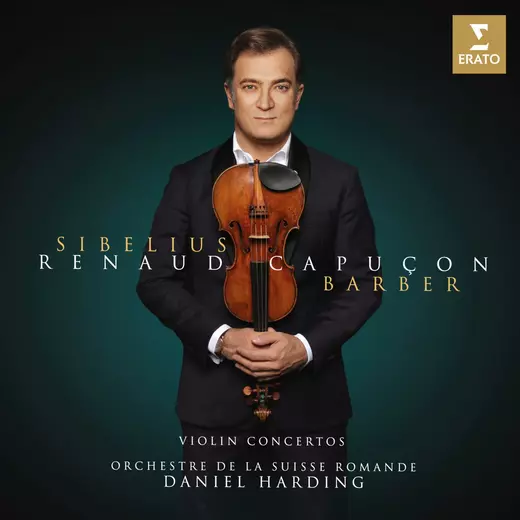
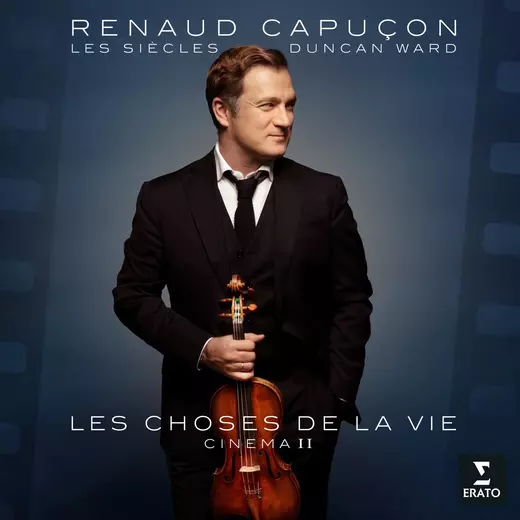
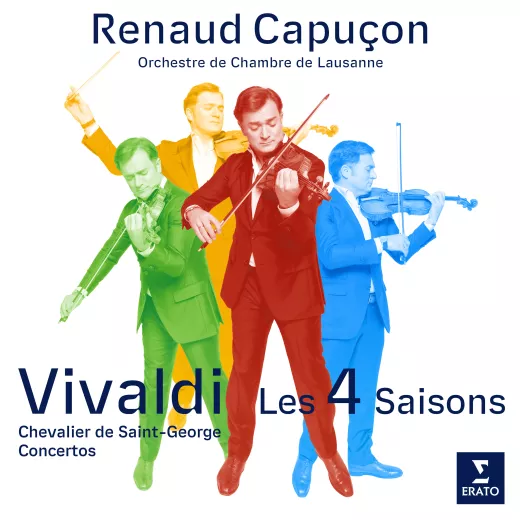
Vivaldi: The Four Seasons - Chevalier de Saint-George: Violin Concertos Op.5 & Op.8
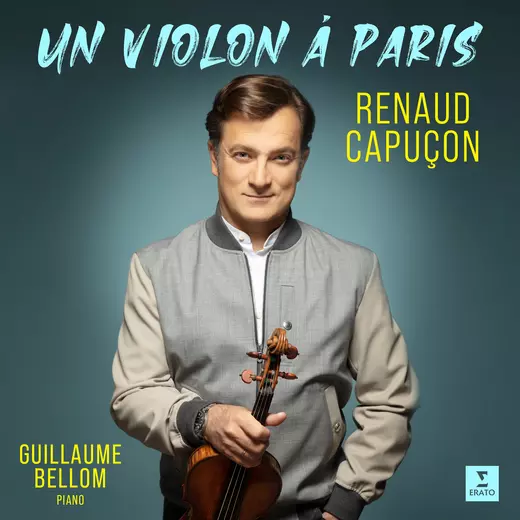
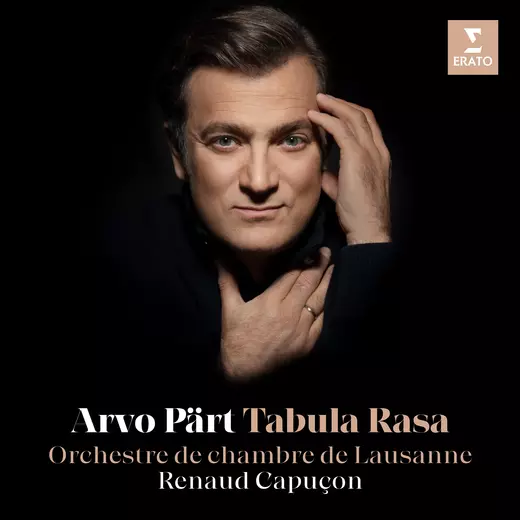
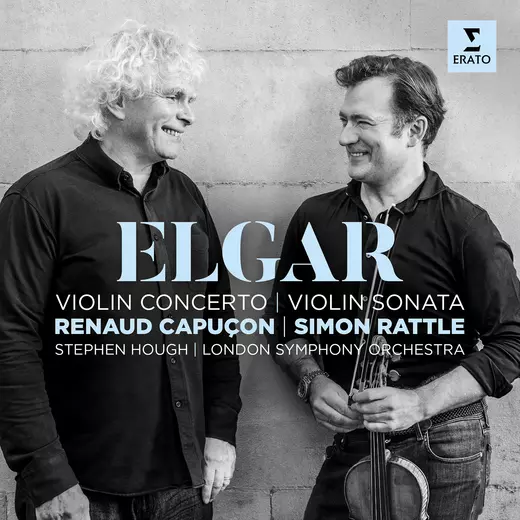
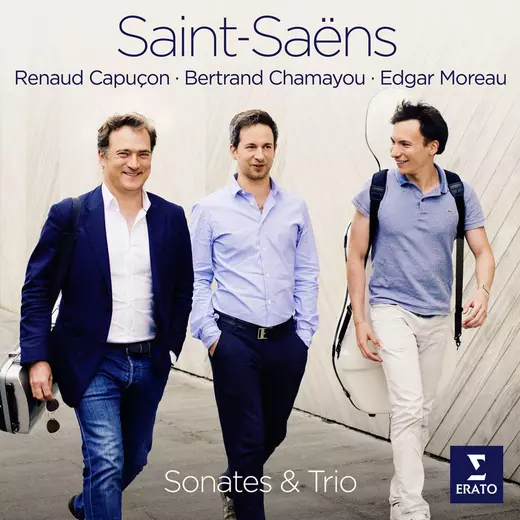
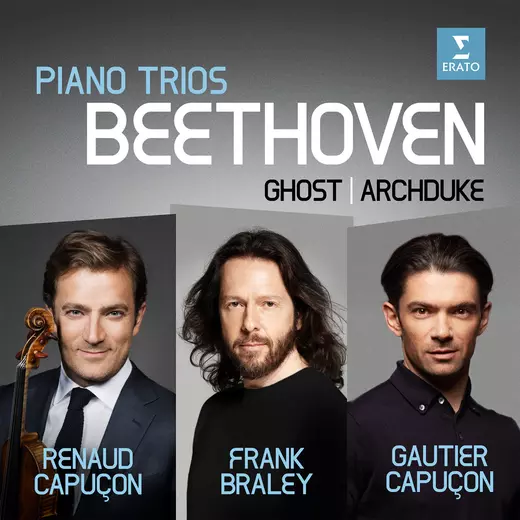
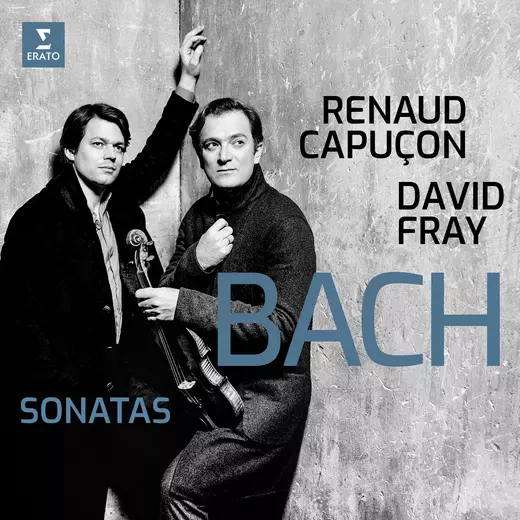
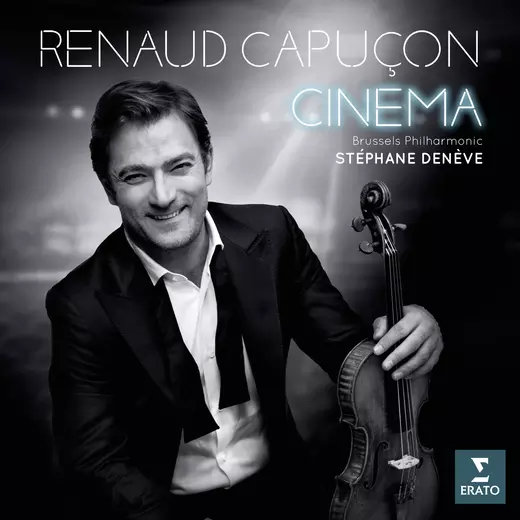
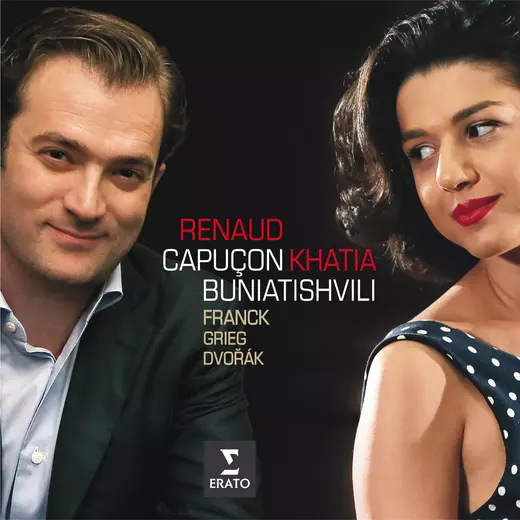
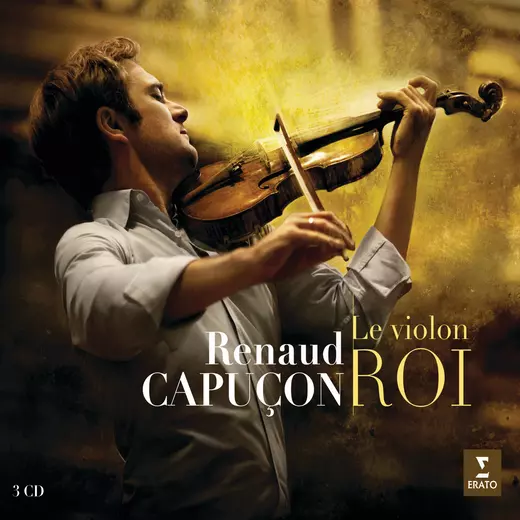
Upcoming Concerts
Sunday
Monday
Friday
Saturday
Sunday
